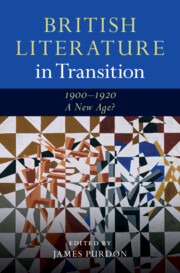Book contents
- British Literature in Transition, 1900–1920: A New Age?
- British Literature in Transition Series
- British Literature in Transition, 1900–1920: A New Age?
- Copyright page
- Contents
- Contributors
- General Editor’s Preface
- Acknowledgements
- Introduction
- Part I Nation and Empire
- Part II Media
- Part III Aesthetics
- Chapter 12 Transitions, Turns
- Chapter 13 Poetry and Transition
- Chapter 14 Realism and Mass Politics
- Chapter 15 Short Fiction
- Chapter 16 Ideals of a Picture Gallery
- Part IV Society
- Index
Chapter 14 - Realism and Mass Politics
from Part III - Aesthetics
Published online by Cambridge University Press: 07 December 2021
- British Literature in Transition, 1900–1920: A New Age?
- British Literature in Transition Series
- British Literature in Transition, 1900–1920: A New Age?
- Copyright page
- Contents
- Contributors
- General Editor’s Preface
- Acknowledgements
- Introduction
- Part I Nation and Empire
- Part II Media
- Part III Aesthetics
- Chapter 12 Transitions, Turns
- Chapter 13 Poetry and Transition
- Chapter 14 Realism and Mass Politics
- Chapter 15 Short Fiction
- Chapter 16 Ideals of a Picture Gallery
- Part IV Society
- Index
Summary
All of the historicising of literary modernism in recent decades has brought scholars of literature to a point where the application of a simple test is warranted. We should ask, that is, whether the historical phenomena that made literary modernism what it was also extensively shaped the majority of literary practice delivered in a realist mode. The ‘modernismists’ amongst us must face an uncomfortable possibility: if modernism’s major causes can be found shaping the rest of the literary production of the period which we associate with modernism – that is, those works not commonly deemed modernist – then any intrinsic justification for categorising certain works as ‘modernist’ has disappeared. This chapter looks in detail at the impact of one of the established causes of literary modernism – the shift from individualism to collectivism in European politics during the late nineteenth century – on realist writing, to test the easy assumption that literary modernism was unique in being influenced by collectivist politics. It shows that the distinctiveness, self-consciousness, and sensitivity to the surrounding world that is conventionally ascribed to modernism is, at least, overstated.
- Type
- Chapter
- Information
- British Literature in Transition, 1900–1920: A New Age? , pp. 260 - 278Publisher: Cambridge University PressPrint publication year: 2021

